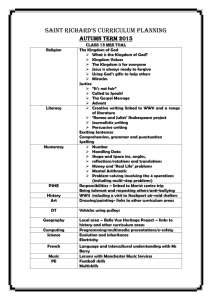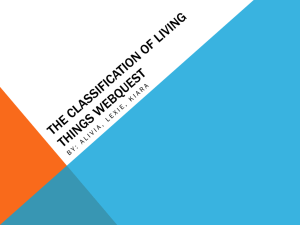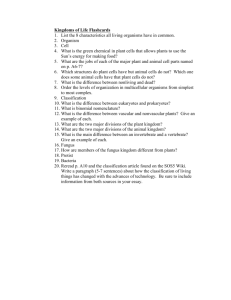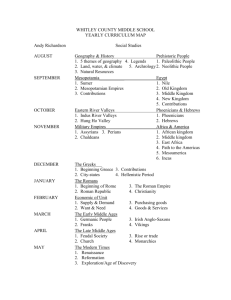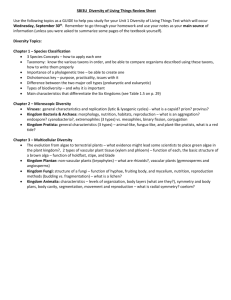(c) crown copyright Catalogue Reference:CAB/129/78 Image Reference:0016
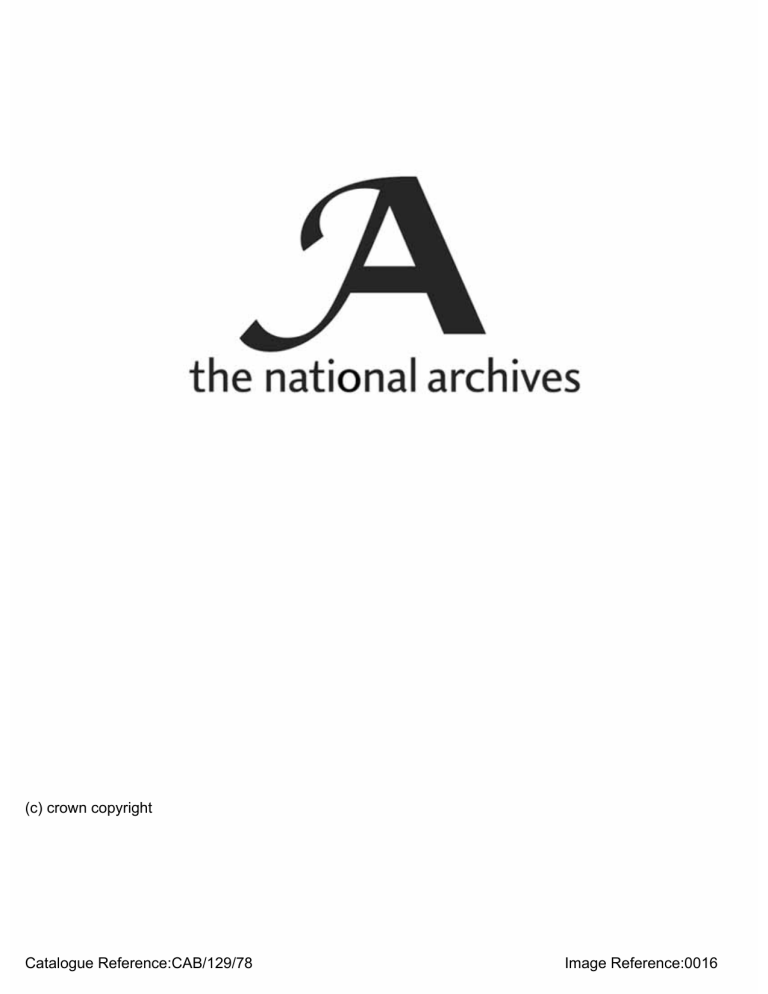
(c) crown copyright
Catalogue Reference:CAB/129/78 Image Reference:0016
THIS DOCUMENT IS THE PROPERTY OF HER BRITANNIC MAJESTY'S GOVERNMENT
Printed for the Cabinet. October 1955
S E C R E T Copy No. ^8
C P . ( 5 5 ) 1 6 6
29th October, 1955
C A B I N E T
C O L O N I A L I M M I G R A N T S
M E M O R A N D U M BY THE SECRETARY OF STATE FOR THE H O M E D E P A R T M E N T AND
M I N I S T E R FOR W E L S H A F F A I R S
On 15th September the Cabinet invited me to circulate a draft Bill to control
Colonial immigration, as a basis for discussion at a later meeting ( C M
31st Conclusions, Minute 4). Following the Cabinefs discussion on 6th December,
1954, C C . (54) 82nd Conclusions, Minute 7, a draft Bill for this purpose had already been prepared and I circulate the Bill and an accompanying memorandum.
The Bill includes within its scope all British subjects from overseas, and if it is decided to proceed with it, decisions will be needed on two major questions, viz.
(a) whether any legislation to control the immigration of persons not belonging to the United Kingdom should apply to all British subjects from overseas or only to those from the Colonies; and (b) whether in either case citizens of the Irish
Republic should also be made subject to control.
2. The main argument in favour of confining a control to British subjects from the Colonies is that it is the arrival in the United Kingdom in rapidly increasing numbers in recent years of Colonial immigrants, particularly from the
West Indies, which has given rise to public concern and has created the social problems, mainly housing ones, to which, so long as no control over immigration can be exercised, there appears to be no solution; and that to make the control general would be unnecessary and would cause dismay and resentment in the older Dominions. The main arguments in favour of extending the control to all
British subjects from overseas are (a) that while a general control of immigration can be effectively defended on principle a limitation to Colonial citizens could not be so defended, would be vulnerable to attack as a measure of racial discrimination and would be bitterly resented in the West Indies; (b) that a control applying only to citizens of the United Kingdom and Colonies would become increasingly ineffective as Colonies achieved full independence and established their own separate citizenships; and (c) that if there is to be any control it would be unwise to exclude from its scope immigration from India and Pakistan which might easily become a serious problem. It would presumably be out of the question to extend the control to those two alone of the self-governing countries of the Commonwealth.
3. Political objections to excluding citizens of the Irish Republic from an immigration control applying to any class of British subjects are obvious, but there is a strong case, based on the facts of geography and history as well as on practical considerations, for treating the population of the British Islands as a single unit.
The institution of an immigration control on the ordinary traffic between Great
Britain and Ireland, which would be necessary if the control were applied to all citizens of the Irish Republic, would give rise to great inconvenience and would be much resented by the inhabitants of Northern Ireland who would have to carry passports.
48983 B
4. The Bill which I am circulating would bring within the scope of the control all British subjects from overseas, i.e., not only inhabitants of the Colonies. As explained in the memorandum attached to the Bill, it would deal with the Irish problem by excluding from the scope of the control citizens of the Irish Republic ordinarily resident in the British Isles, but not those coming here from overseas.
G. L L . - G .
Home Office, S.W. I,
27th October, 1955.
M E M O R A N D U M O N T H E BILL
1. The Bill makes it possible to prohibit the entry into the United Kingdom of any British subject not belonging to the United Kingdom or any citizen of the
Irish Republic, subject to certain exceptions. For the purpose of the Bill a British subject would be regarded as belonging to the United Kingdom if he was born there or if he is the holder of a United Kingdom, Channel Islands or Isle of Man passport. It is further provided (Clause 1 (2) (b)) that a British subject or citizen of the Republic of Ireland ordinarily resident within Great Britain or Ireland or the Channel Islands or the Isle of Man shall not be liable to control when travelling to the United Kingdom from anywhere else in that area. The effect of this is to take outside the scope of the restrictions citizens of the Irish Republic ordinarily resident in the Republic when travelling to this country. A citizen of the Republic coming here from Australia would be liable to control in the same way as a citizen of Australia.
2. It would thus not be necessary to set up an immigration control on the ordinary traffic between Great Britain and Ireland, but a control could be put on at any time if it appeared necessary to prevent British subjects from overseas attempting to come here by way of Ireland.
3. It is provided that entry could not be refused to anyone within the scope of the control if he satisfied the authorities that he was coming only for a temporary visit, or to take up authorised employment, or that he was in a position to support himself and his dependants in the United Kingdom without taking employment, provided that even if these requirements were satisfied he could still be excluded if he had been convicted of crime and sentenced to a term of imprisonment of not less than twelve months, or his entry would be undesirable for medical reasons, or he was a person likely to act to the prejudice of national security or public order, or to promote industrial unrest.
4. In view of the housing difficulties caused by unrestricted immigration provision has been made in clause 1 (3) (b) for entry to be refused to any person, other than a temporary visitor, who fails to satisfy the Immigration Officer that satisfactory housing is available for himself and his dependents, if any. It would probably be impracticable to devise a completely effective housing control, but it is thought that considerable assistance could be given to housing authorities by requiring immigrants to obtain from a housing authority, in advance of their arrival in the United Kingdom, a certificate that satisfactory housing accommodation is available and any Bill giving power to restrict immigration should not omit some provision for making it possible to attempt to deal with this aspect of the problem which is in some ways the most serious at the present time.
5. It can be argued that once the principle of control is accepted it would be better not to specify in too much detail the classes of persons who should be allowed to enter the United Kingdom as of right, although not belonging to it.
The stereotyping of classes in an immigration statute is always liable to cause difficulty, since circumstances arise in which the provisions of the statute are embarrassing. It has nevertheless been thought that it would be likely to make the measure more acceptable if some indication of the scope of the restrictions to be enforced were incorporated in it. It should be added that a distinction has been preserved between British subjects from overseas and aliens in that all aliens are required by law to obtain leave to land in the United Kingdom while under this measure no British subject would require leave to land, though certain British subjects would be liable to be prohibited from landing.
6. The criterion for determining whether a British subject should be regarded as belonging to the United Kingdom for this purpose is based on birth in the United Kingdom, the Channel Islands or the Isle of Man, or the possession of a valid passport issued by the Government in those territories, because this is a criterion which can readily be applied by Immigration Officers at the port of entry.
The place of birth of the holder of a British passport is always stated in the passport. A n y more elaborate criterion conferring a right of exemption from liability to control related to, for example, residence or domicile would be likely to create such difficulties at ports as would result in unreasonable delays to the
48983 B 2
main body of travellers. The fixing of the criterion set out in the Bill does not, however, mean that persons who do not " b e l o n g " to the United Kingdom within that definition would necessarily be excluded. For instance, a British subject who could not be regarded as belonging to any other British territory would not in any circumstances be excluded and it would be possible to arrange, if experience suggested that this was desirable, for the passports of such people and of other British subjects long resident in the United Kingdom to be so endorsed, when they had once been identified, as to ensure that they would not encounter difficulty on subsequent journeys.
7. The Bill would also give power to deport from this country a British subject or citizen of the Republic of Ireland, unless he had been born within the United
Kingdom, the Channel Islands or the Isle of Man, or both of his parents had been resident in any of those territories when he was born, or he had been ordinarily resident for the last previous seven years in any of those areas. While this provision does not on the face of it discriminate between citizens of Commonwealth countries on the one hand and Colonial subjects on the other it would as the British
Nationality Act, 1948, stands make for unequal treatment because under that Act citizens of self-governing Commonwealth countries are entitled to be registered as citizens of the United Kingdom and Colonies after one year's residence here and in the case of certain Commonwealth countries they lose their original citizenship if they so register. The effect in such a case would be to make it impossible to deport the individual after he had acquired United Kingdom citizenship, because there would no longer be a country to which he could be deported.
8. It would clearly be undesirable in an attempt to overcome this difficulty to reduce to only one year the period of continuous residence in the United
Kingdom, during which British subjects from overseas would be liable to deportation. A n alternative course would be to reduce the period of continuous residence to five years (which would conform to the practice in certain overseas territories) and at the same time to amend the Act of 1948 by extending the period of residence in the United Kingdom qualifying for United Kingdom citizenship to five years, giving the Home Secretary power in his discretion to permit registration within a shorter period in suitable cases.
9. The Bill provides that the circumstances in which the Secretary of State could make a Deportation Order are to be specified in the Order in Council. It would thus be possible to provide, as in the Aliens Order, simply that the Secretary of State could make a Deportation Order in any case in which it appeared to him to be conducive to the public good to do so. The effect would be that the Secretary of State could not be required to state the grounds on which he had acted and his action would not be subject to any kind of judicial review. That would no doubt attract criticism and it may be that such a wide discretion in the Secretary of State would be more easily accepted if provision were made for his action to be taken after judicial enquiry or to be subject to review by some form of judicial process.
The wide discretion under the Bill as it stands could also have repercussions in
Colonial territories. T o prevent arbitrary decisions as far as possible in deportation cases in the Colonies, policy in regard to the deportation of British subjects from
Colonial territories has hitherto aimed at defining by statute, in broad terms, the grounds on which such individuals could be deported, and by stipulating (without affecting the discretion of the Executive) that, before a deportation order is made, a Judge or Magistrate is to hold an enquiry (if necessary in Chambers) and make a report to the Governor on the facts and on any point of law which may be raised.
If no provisions for judicial process were included in the draft United Kingdom legislation it would be difficult to resist pressure on the part of Colonial Governments to introduce a similarly wide measure of discretion into their own legislation, and consequently to create the danger of arbitrary deportation of British subjects.
10. In the view of the Home Secretary, who would be responsible for exercising these powers, it is, however, most desirable that the power should not be subject to detailed regulation in the statute and that the Secretary of State should have the wide discretion which the Bill confers. Experience in the case of aliens has shown that it would be difficult to draft detailed provisions covering the wide variety of cases which may arise, and there are a small proportion of cases in which it would be contrary to the public interest that the Secretary of State should have to specify the grounds on which he is acting. A provision which set out in detail the grounds on which Deportation Orders could be made would thus be
unsatisfactory in practice, and a most inconvenient precedent. The wide discretion conferred on the Secretary of State by the Aliens Order has been the subject of criticism from time to time, but it is fair to say that this criticism derives most of its force from the suggestion that the Secretary of State by his exercise of this power can expel from the country at his sole discretion an alien who may have been resident here many years and whose interests and associations may be mainly with this country, and the fact that it is very rare for the power of deportation to be exercised in such circumstances is not a complete answer. Under this Bill the
Secretary of State would not in any case be able to deport an individual who had been resident in this country for seven years (or five years if the proposal in paragraph 8 above is adopted), and in the Home Secretary's view that, and the fact that the Secretary of State's actions can be challenged in Parliament at any time, is sufficient safeguard of the rights of the individual.
CONFIDENTIAL
4 Eliz. 2 Commonwealth Immigrants 1
D R A F T
O F A
B I L L
T O
Enable Her Majesty to provide for restricting the immigration of certain British subjects, British protected persons and citizens of the Republic of
Ireland, and for the deportation of such subjects, persons and citizens in certain cases; and for purposes
A connected with the matters aforesaid.
B
E it enacted by the Queen's most Excellent Majesty, by and with the advice and consent of the Lords Spiritual and
Temporal, and Commons, in this present Parliament assembled, and by the authority of the same, as follows:—
-
D
-
1 9 5 5
5 1.—(1) Subject to the provisions of this section, Her Majesty Restriction of may by Order in Council make such provision as appears to immigration
Her to be expedient in the public interest (including the general fi^w^ s i?
n interests of the citizens or inhabitants of Commonwealth countries
t j o n
. outside the United Kingdom)—
10 (a) for restricting the entry into the United Kingdom by sea or air of British subjects born outside the United
Kingdom, the Channel Islands and the Isle of Man;
(b) for the imposition upon such subjects, on their entry into the United Kingdom as aforesaid, of conditions as to the
15 period for which they may remain therein [or] their employment or occupation therein [or other matters specified in the Order in Council], and for the revocation or variation of such conditions by the Secretary of
State;
20 (c) for authorising the Secretary of State, in such circum stances as may be specified in the Order in Council, to make an order (in this Act referred to as a deportation order) requiring any such subject to leave and thereafter remain out of the United Kingdom.
7-2
2
Commonwealth Immigrants
4 ELIZ. 2
A.D. 1955 (2) So much of any Order in Council under this Act as makes provision for purposes specified in paragraph (a) or paragraph
(b) of the last foregoing subsection shall not apply to any person who—
(a) is the holder of a valid passport issued to him by the 5
Government of the United Kingdom, of any of the
Channel Islands or of the Isle of Man (not being a passport so issued on behalf of the Government of any other part of the Commonwealth); or
(b) being ordinarily resident within the British Islands, 1 0 arrives on a ship or aircraft which began its voyage at a place within those Islands and has not during the voyage called at any place outside those Islands.
(3) An Order in Council under this Act shall not prohibit or confer power to prohibit the entry into the United Kingdom of 1 5 a person who satisfies such authority as may be specified in the
Order—
(a) that he wishes to enter for the purpose of a temporary visit only; or
(b) that he wishes to enter for the purpose of taking up 2 0 employment under an employer who is authorised for the purposes of the Order to employ him, or that he is in a position to support himself and his dependants
(if any) while in the United Kingdom, otherwise than by taking employment therein, and in either case that 2 5 suitable housing accommodation is available for him in the United Kingdom, unless, in any such case, it appears to the said authority that his entry would be undesirable for medical reasons, or that he has been sentenced in any country to imprisonment for a term of 30' not less than twelve months or is a person likely to act to the prejudice of national security or public order, or to promote industrial unrest.
( 4 ) A deportation order shall not be made by virtue of an
Order in Council under this Act in the case of any person who 3 5 for the time being is ordinarily resident in the United Kingdom, the Channel Islands or the Isle of Man, and has been so resident for the last previous seven years, or in the case of any person both of whose parents were so resident at the time of his birth.
(5) This section applies in relation to British protected persons 4 0 and citizens of the Republic of Ireland as it applies in relation to
British subjects.
Supplementary 2.—(1) An Order in Council under this Act may make provisions as provision-
CounciT
S m
( a
) f
Q r
conferring and imposing on the Secretary of State, 45 and such officers as may be designated in the Order,
4 ELIZ. 2
Commonwealth Immigrants 3 such powers and duties as appear to Her Majesty to A.D. 1955 be expedient for purposes of the administration of the Order;
(b) for the examination of persons seeking to enter the
5 United Kingdom by sea or air, with a view to ascertain ing whether any provision of the Order, or any power thereby conferred, applies or ought to be exercised, and for the detention of such persons pending examination;
(c) for the arrest, detention and removal from the United
10 Kingdom of persons whose entry is prohibited by or under the Order, or who remain in the United Kingdom in contravention of conditions imposed by or under the Order, and of persons subject to deportation orders made thereunder;
1 5 (d) for requiring persons liable to be detained under the
Order to report to the police;
(e) for imposing obligations upon the owners and masters of ships and the owners and commanders of aircraft entering or leaving the United Kingdom with passengers;
2 0 (/) for enabling the Secretary of State to make orders or regulations for purposes of the Order, and for applying the Statutory Instruments Act, 1 9 4 6 , to orders or regulations so made;
(g) for such other ancillary matters as appear to Her Majesty
2 5 to be expedient for the purposes of the Order.
( 2 )
Any Order in Council made under this Act may be varied or revoked by a subsequent Order in Council made thereunder.
( 3 ) Any statutory instrument containing an Order in Council under this Act shall be subject to annulment in pursuance of
3 0 a resolution of either House of Parliament.
3 . — ( 1 )
Any person who acts in contravention of, or fails to Offences and comply with, any provision of an Order in Council made under penalties, this Act, or of any orders or regulations made, conditions imposed or directions given thereunder, shall be guilty of an offence.
3 5 ( 2 ) Any person guilty of an offence under this section shall be liable on summary conviction to a fine not exceeding one hundred pounds or to imprisonment for a term not exceeding six months.
( 3 ) For the purposes of a trial of a person for an offence under this section, the offence shall be deemed to have been
4 0 committed either at the place at which it actually was committed or at any place in which the offender may be.
( 4 ) In the application of this section to Northern Ireland,
" summary conviction" means conviction in accordance with the enactments (including enactments of the Parliament of
4 5 Northern Ireland) for the time being in force in Northern
Ireland relating to summary jurisdiction.
4 .
This Act may be cited as the Commonwealth Immigrants Short title;
Act,
1 9 5 5 .
CONFIDENTIAL
Commonwealth Immigrants
D R A F T
OF A
B I L L
To enable Her Majesty to provide for restricting the immigration of certain
British subjects, British protected persons and citizens of the Republic of Ireland, and for the deportation of such subjects, persons and citizens in certain cases; and for purposes connected with the matters aforesaid.
CCXXXVIII—K (3)
28
/ft October, 1955
7 - 2
(37909)
